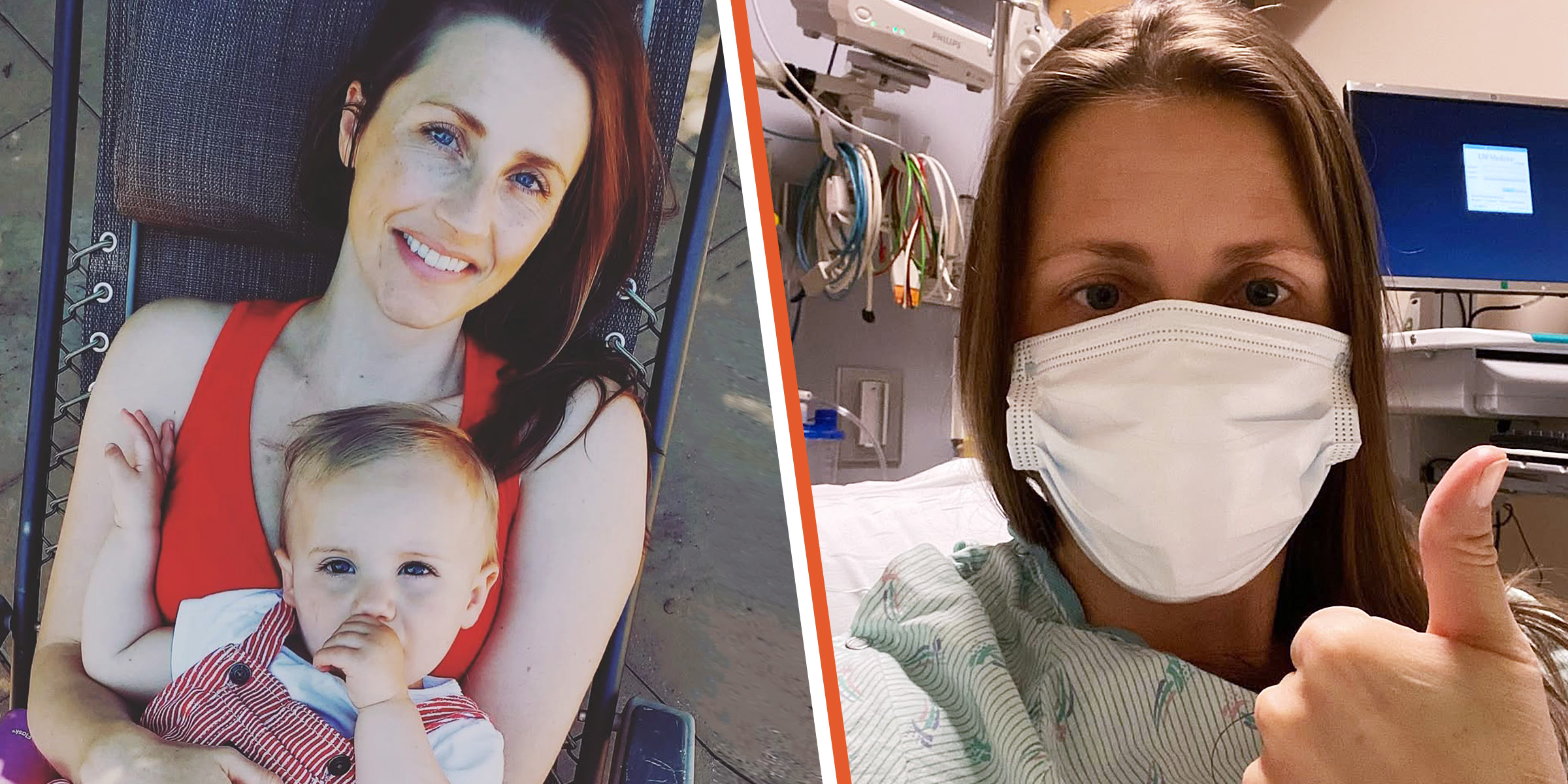
Doctor Thought a Woman's Post-Birth Symptoms Were Just Stress – Now the Mother of 2 Fights for Her Life Due to a Deadly Illness
She gave birth just as hospitals worldwide were locking down. Within weeks, she was in unbearable pain, but instead of getting answers, she was prescribed probiotics, painkillers, and eventually antidepressants. By the time she saw the right specialist, the damage was irreversible.
When a woman delivered her second child in early 2020, she expected the usual exhaustion that comes with newborn care. What she didn't expect was the intense and persistent pain that began soon after and refused to go away. With hospitals operating under strict pandemic protocols, her symptoms were quickly written off as typical postpartum stress.
But her instincts told her something else was going on. As weeks turned into months, she kept searching for answers, only to face more dismissals and inconclusive tests. It wasn't until one specialist skipped the usual exams and ordered one last test that the truth came to light, far later than it should have.
Pain Emerges in Late Pregnancy
In the final weeks of her second pregnancy, Natalie Phelps began experiencing sharp pain in her lower back, pelvis, and rectal area. At 38 years old and expecting her second child, she mentioned the discomfort to her OB-GYN. The response was quick: it was likely hemorrhoids, a common complaint late in pregnancy.
Phelps hadn't dealt with hemorrhoids during her first pregnancy, but the explanation seemed plausible. After giving birth two weeks early in March 2020, she was discharged with pain medication and antibiotics for other complications. At first, the ongoing discomfort didn't raise alarms.
"I lost all the baby weight really fast, and I remember [thinking], 'Wow, I guess that breastfeeding really does work,'" she shared. In hindsight, the rapid weight loss was an early warning sign. But, at the time, she chalked it up to the demands of new motherhood. The pain didn't go away, and within weeks, more symptoms began to appear.
Worsening Symptoms Weeks After Giving Birth
By six weeks postpartum, Phelps noticed a distinct shift in her bowel movements. What began as constipation turned into intermittent loose stools, without a clear cause. The irregularity continued, and by the ninth week, she became certain that what she was experiencing had nothing to do with childbirth recovery.
She contacted her OB-GYN again, who acknowledged that the symptoms were no longer postpartum-related and recommended that Phelps see a gastroenterologist.
Instead, she decided to first consult her primary care physician, hoping for quicker access to care during the ongoing lockdown. That decision would add months to her diagnostic timeline.
Dismissed and Disbelieved
When Phelps contacted her primary care doctor, pandemic restrictions meant that appointments were being conducted virtually. After describing her worsening symptoms and level of pain, the physician agreed to an in-person visit, though the scheduling was delayed due to lockdown conditions.
At the appointment, the doctor performed a rectal exam but found nothing. An ultrasound and X-ray were also ordered, but both came back inconclusive. Despite the persistence and escalation of symptoms, Phelps was told it could be nerve damage from childbirth or the result of multiple antibiotics taken after delivery.
She was advised to take probiotics and monitor her condition. But not long after, she began seeing blood and mucus in her stool. The pain intensified to the point that basic activities became impossible.
The Breaking Point
By May 2020, Phelps was in constant, severe pain. She could no longer walk or sit without discomfort, and sleep became impossible. One night, overwhelmed and exhausted, she sent a message to her doctor at 4 a.m., explaining that she was taking 600 milligrams of ibuprofen around the clock just to function.
The response was another redirection. Her doctor prescribed Cymbalta, an antidepressant, and referred her to a therapist. At first, Phelps questioned whether the stress of giving birth during a pandemic, combined with isolation and fatigue, might actually be contributing to her condition.
"I was so rundown from being in isolation, from being in pain, from having this terrible birth that I almost just conceded to this idea for a moment," she recalled. "I said, 'Well, maybe it is in my mind.'"
Therapy brought no relief. Her therapist eventually asked why she was there at all, given that her symptoms were clearly physical. It became clear that this path wasn't leading to answers.
A Friend's Advice and One Final Push
With no relief from therapy and her condition continuing to worsen, Phelps turned to a trusted friend who worked in medicine. The friend urged her to pursue more advanced testing, including an MRI and a colonoscopy. Phelps then met with a naturopathic practitioner who ordered an MRI of her lower pelvis. The scan did not show anything concerning.
A third rectal exam also came back normal. Despite the repeated tests and inconclusive results, Phelps held onto her upcoming appointment with a gastroenterologist scheduled for the end of July. By this point, she had little expectation of finding anything new.
When the specialist finally saw her, he opted not to perform another physical exam. Instead, he scheduled a colonoscopy without delay.
A Diagnosis Too Late
On July 31, 2020, Phelps underwent a colonoscopy. She had gone into the procedure expecting to wake up to something manageable, perhaps colitis or Crohn's disease. Instead, the doctor told her they had found a very large tumor in her colon, and that it was almost certainly cancer.
She was diagnosed with colorectal cancer, also known as colon cancer. It is the third most common cancer diagnosed in the United States. While it has traditionally affected people over 50, cases among younger adults have been rising steadily.
In fact, over the past 15 years, the number of people aged 20 to 49 diagnosed with colon cancer has increased by about 1.5 percent each year. Medical researchers are still working to understand why. Phelps was just 38 at the time. Her cancer had already metastasized to her liver, and it was stage four.
Colorectal cancer can be difficult to detect early. Many people have no symptoms at all, and when symptoms do appear, they are often mistaken for more common and less serious conditions. Warning signs may include blood in or on the stool, unexplained changes in bowel habits, abdominal pain, bloating, vomiting, unexplained weight loss, or persistent fatigue.
Phelps had experienced several of these symptoms, including rapid weight loss, loose stools, rectal bleeding, and persistent pain. But for months, each of these signs had been overlooked or attributed to postpartum changes, stress, or minor digestive issues.
The diagnosis left her in shock. Her youngest child was just over four months old, and her older son had only recently turned three. She recalled collapsing to the floor, overwhelmed by the fear that her children might grow up without her. With the cancer already advanced, she had to begin treatment immediately.
Radical Surgery and a Long Recovery
Phelps began chemotherapy and radiation shortly after her diagnosis. For months, she underwent cycles of chemotherapy while doctors prepared her for extensive surgery. In April 2021, she underwent an 18-hour operation.
Surgeons removed her rectum, perineum, uterus, ovaries, and two-thirds of her vaginal canal. They also performed a major reconstructive procedure, using tissue from her thigh to help rebuild the pelvic area. The surgery left her with a permanent colostomy bag. Recovery was slow and painful.
For months, she couldn't sit without discomfort and had to relearn how to walk due to the tissue removed from her leg. She also required pelvic floor therapy and additional treatment to help her surgical wounds heal. Despite the aggressive treatment, cancer cells remained.
In January 2022, she resumed chemotherapy, continuing through May. Her recovery has been ongoing ever since, with lingering pain, physical limitations, and regular treatments. Yet even with all she has endured, Phelps has managed to reach a milestone that many in her situation do not.
Marking Five Years Since Diagnosis
On July 31, 2025, Phelps marked five years since the day she was diagnosed. She shared a photo on Instagram taken shortly before her colonoscopy, reflecting on how visibly unwell she had been and how deeply afraid she was that her children might grow up without memories of her.
In the time since, every good day spent with her family has come at the cost of a difficult day of treatment. Though she is still undergoing care, Phelps says she is grateful for one thing above all: her children, now five and eight, will remember her.
"If I were gone, they would remember me. That means everything," she wrote. She acknowledged that she is not yet where she hoped to be, but added that she is holding on to the hope of having many more years ahead.
Encouraging Screening and Self-Advocacy
Since her diagnosis, Phelps has used her experience to urge others to take persistent symptoms seriously and to push for answers when something feels wrong. She often reflects on how much might have been different if she had been screened sooner.
"If I had caught this when I was 35, it would have been a completely different story," she said. Her story has already made an impact close to home. After learning of her diagnosis, Phelps' brother, then 33, scheduled a colonoscopy. Doctors found and removed precancerous polyps, potentially preventing a much more serious outcome.
While colon cancer cannot always be prevented, there are ways to lower the risk. Avoiding tobacco, maintaining a healthy weight, and drinking alcohol in moderation are all considered important factors. Diet also plays a role. Experts recommend eating more fruits and vegetables while limiting red meat, processed foods, and high-fat or high-calorie meals.
Some studies suggest that drinking coffee may also help reduce risk. Knowing your family history is another key step. Colon cancer can run in families. Anyone with a biological parent, sibling, or child who has had colon cancer or advanced polyps, especially before age 45, should discuss early screening options with a healthcare provider.
People with chronic inflammatory bowel disease may also need to begin screening earlier than the general guidelines suggest. The standard recommendation for most adults is to begin screening at age 45. Phelps's story is a reminder that symptoms can appear much earlier, and that early testing can be lifesaving.
The information in this article is not intended or implied to be a substitute for professional medical advice, diagnosis or treatment. All content, including text, and images contained on news.AmoMama.com, or available through news.AmoMama.com is for general information purposes only. news.AmoMama.com does not take responsibility for any action taken as a result of reading this article. Before undertaking any course of treatment please consult with your healthcare provider.
